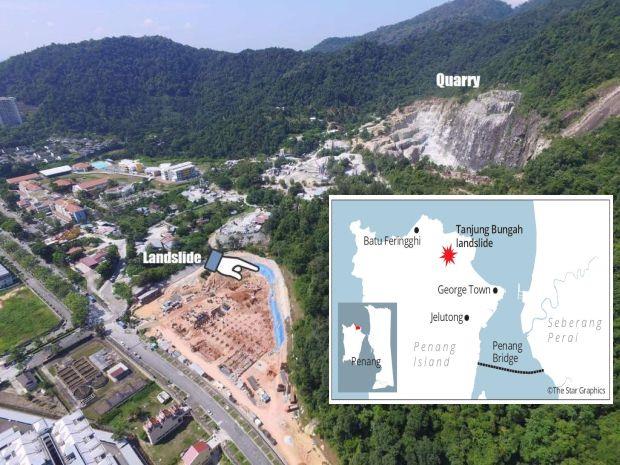 |
| Design engineers at fault in landslide tragedy | The Star Online |

GEORGE TOWN: The State Commission of Inquiry (SCI) tasked with investigating the Tanjung Bungah landslide in October 2017 has found the design engineer of the slope primarily responsible for the incident that claimed 11 lives.
The SCI, in its 116-page report made public, has recommended that the engineer be investigated by the police under Section 304A of the Penal Code for gross negligence.
Besides the engineer, the commission found another design engineer responsible for being “contributorily negligent” for allowing excavation to be carried out without design, engineering calculations and supervision.
Chief Minister Chow Kon Yeow said the commission found that the slope failure was a man-made tragedy and entirely preventable if those in charge had taken necessary and proper steps to ensure the stability of the slope and the safety of the workers.
“The landslide did not develop overnight, it was a disaster waiting to happen over a period of time.
“There were ample warnings which were sadly unheeded or inadequately heeded,” Chow said of the report at a press conference at his office in Komtar here yesterday.
Chow said the report, dated July 22 this year, was a result of public hearings conducted over 26 days with testimonies from 28 witnesses.
“The commission also considered voluminous documents, reports, photographs and drawings, as well as the opinions of six expert witnesses.
“The report provides further analysis of the background facts, excerpts of testimonies recorded during the hearings and findings on liability against several parties,” he said.
The commission also found the Occupational Safety and Health Department negligent for failing to take adequate steps to ascertain the extent of the danger posed by the unsafe slope, by not promptly issuing a prohibition notice after its visit to the site on Aug 18, 2017, which was two months before the fatal incident.
Chow said copies of the report would be sent to the police, Attorney General’s Chambers, Board of Engineers Malaysia and other authorities involved.
“The report also contains nine recommendations that the commission hopes will serve as guidelines and prevent such incidents from recurring,” he added.
On Oct 21, 2017, a temporary slope in the construction site of a high-rise apartment block in Tanjung Bungah collapsed while workers were trying to stabilise it. Tonnes of earth crumbled, killing 11 workers.
The full SCI report can be bought at Level Three, Komtar, for RM50 per copy between Sept 3 and 30. For more details, call 04-650 5480.- Source link
Chow: Agencies have to act against negligent engineers
 |
| Penang chief minister Chow Kon Yeow |
“It is up to the agencies and the police to take action as recommended by the State Commission of Inquiry (SCI).
“I have also directed the Town and Country Planning Department, Penang Island City Council, Seberang Prai Municipal Council and other related agencies to come up with recommendations to improve hill development.
“It was discussed at the State Planning Committee meeting and I have directed state housing, town and country planning and local government committee chairman Jagdeep Singh Deo to head the committee and come up with the recommendations within a month, ” said Chow at Komtar here yesterday.
It was reported that the SCI tasked with investigating the Tanjung Bungah landslide in October 2017 had found the design engineer of the slope primarily responsible for the incident that claimed 11 lives.
The SCI, in its 116-page report made public, had recommended that the engineer be investigated by the police under Section 304A of the Penal Code for gross negligence.
Besides the engineer, the commission found another design engineer responsible for being “contributorily negligent” for allowing excavation to be carried out without design, engineering calculations and supervision.
Penang Island City Council engineering director A. Rajendran, who was also present at the press conference, said the stop-work order on the project was lifted after the developer completed mitigation works.“However, different engineers have been overseeing the project since work resumed some time ago, ” said Rajendran.
On Oct 21,2017, a temporary slope at the construction site of a high-rise apartment block in Tanjung Bungah collapsed while workers were trying to stabilise it.
Tonnes of earth crumbled, killing 11 workers. - Source link
Read more:
Related posts:
Penang landslide tragedy, plea went unheeded, no one listened !
Don’t allow another landslide tragedy to happen !
Penang landslide, whose faults?
Huge landslide in Tg Bungah hill

Landslide tragedy caused by slope instability, was a Construction mishap, not landslide!
Landslide nation, Malaysia ranks highly for landslides

Penang landslide tragedy, why it happened?

Penang Landslide occured days after remedial works started
Penang floods and landslides, looking beyound natural causes!

Cracked drain causes road cave-in, house nearby on brink of callapse
Penang govt rapped over hill slope development
Invalid drainage and construction damaged nearby houses since 2014 must complete its mitigation quickly!
Penang floods, support pours in for dialogue
Penang Paya Terubong Residents living under shadow of fear!

Call to reassess Penang hillside projects, councillor addresses full council meeting of MBPP

Hills, landslides, floods and damaged houses: What to do?
Penang landslides & flooding are natural disasters man-made?


















